Cinema is a mirror that can change the world – Diego Luna
On May 21, 2024, at the Enugu Lake Resort, the National Film and Video Censors Board (NFVCB)and the Corporate Accountability and Public Participation Africa (CAPPA) assembled leading light of Nollywood to a workshop on healthy film culture. Olayinka Oyegbile was there and he reports
It was only a day-long event, however, by the time it was over and resolutions arrived at, it was like it had been on for weeks or months. On May 21, 2024, the National Film and Video Censors Board (NFVCB)along with the Corporate Accountability and Public Participation Africa (CAPPA), a non-governmental organization gathered the movers and makers of the Nigerian movie industry. It was at the iconic Nike Lake Resort, Enugu. Their mission: to ensure that their movies adhere to world standards in terms of being free of the indiscriminate use of tobacco and other harmful substances.
The one-day event called “National Stakeholders Engagement on #Smokefree Nollywood”, was meant to have the understanding of all workers in the film industry to agree to a standard of conduct among practitioners.
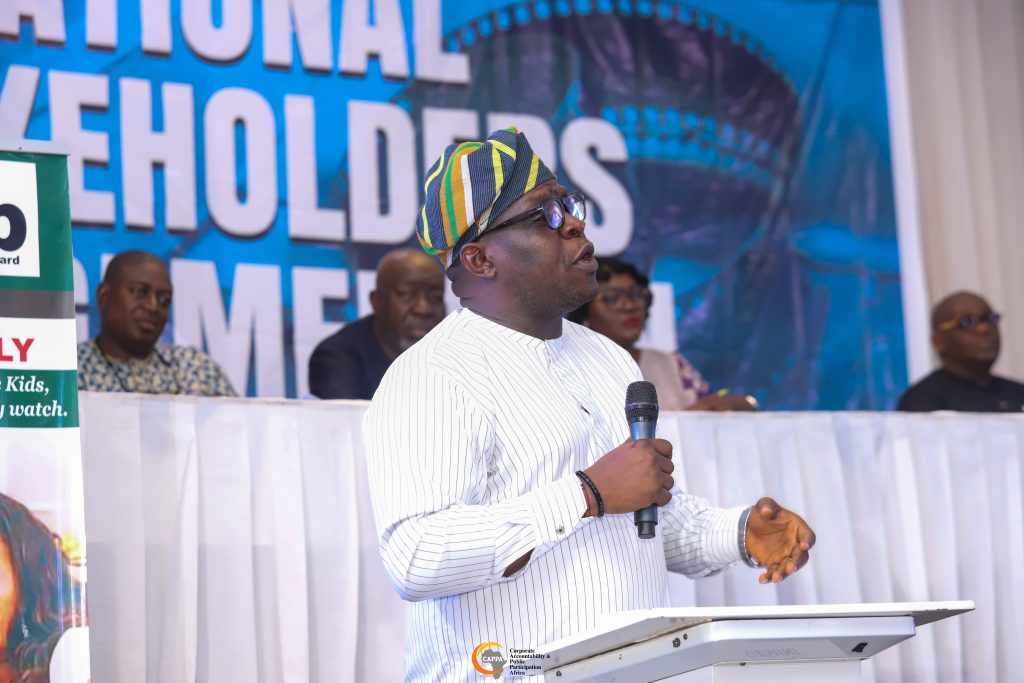
In his welcome address to the participants drawn among producers, actors, directors, make-up artists and so on, the Director General of the NFVCB, Dr. Shuaib Husseini, said it was important for the country as one of the leading film producers in the world to have a code of conduct to guide the sector and also make films produced in the country to be able to play in the international market. In unfolding the agenda of his administration at the Board, he said the stakeholders’ meeting in Enugu was the first step for him to meet all those involved in the industry to dialogue with them so that they can all be on the same page in achieving the goal of a healthy film industry that would be able to compete globally.
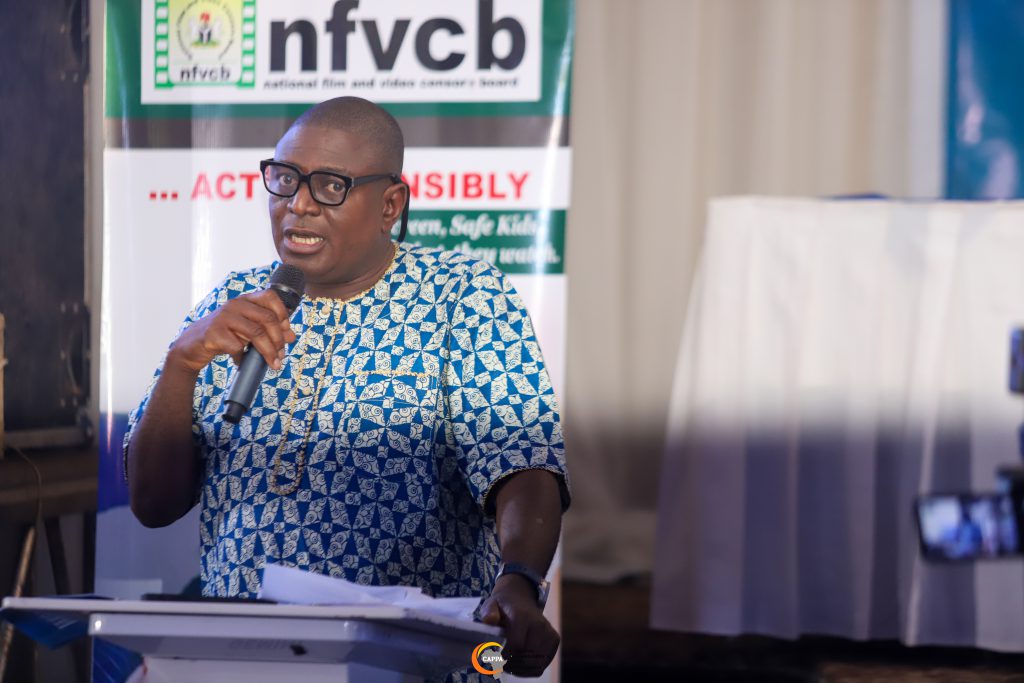
He said, “It is important for us to engage stakeholders by having a series of engagements and let them know what is happening in the world of cinema.” According to him, the time has passed when the Board and the Nigeria Film Corporation (NFC) worked at cross purposes. He said it was time for the two agencies to work together and stick to their distinct functions and not see themselves as competitors in the film sphere.
Moving from censorship to classification
Dr. Husseini while agreeing that the movie industry occupies a central position in the entertainment and creative sector, emphasized that it was imperative to continue to place the highest premium on the progress of the industry by ensuring that films/video works, musical videos and skits are free of depiction and glamourisation of harmful substances such as smoking of tobacco, violence, criminal acts, immoral acts, and money ritual.
He called on practitioners to acknowledge the fact that the industry was today faced with an emergency “requiring bold and ambitious actions from all of us as parents, guardians and stakeholders. Therefore, after series of engagements, the NFVCB in collaboration with the CAPPA decided to do Subsidiary Regulations to cater for smoking in movies since this aspect was not expressly spelt out in the extant Law.”
He announced to the applause of the practitioners that the Minister of Arts, Culture and the Creative Economy, Hannatu Musa Musawa, has approved the “Prohibition of Money Ritual, Ritual Killing, Tobacco, Tobacco Product, Nicotine Product Promotion, Glamorization, Display in Movies, Musical Videos and Skits” Regulations 2024. This, he added, has been forwarded to the Federal Ministry of Justice for Gazette.
The DG appealed to all stakeholders to see the Enugu meeting as an opportunity to build a strategic partnership to mobilize the creative sector in pursuit of a noble public health cause. He read the riot act to all violators of the rules of engagement saying, “Of recent, we realized that tobacco industries hide under the banner of entertainment to flaunt smoking. The NFVCB is well prepared to take leadership in this regard and has planned and begun implementing innovative ways to achieve its mandate, especially at this crucial time when the National Assembly is insisting that there is “Need to curb the rising spate of cultism, trafficking, consumption of illicit drugs and other substances among youths in Nigeria.”
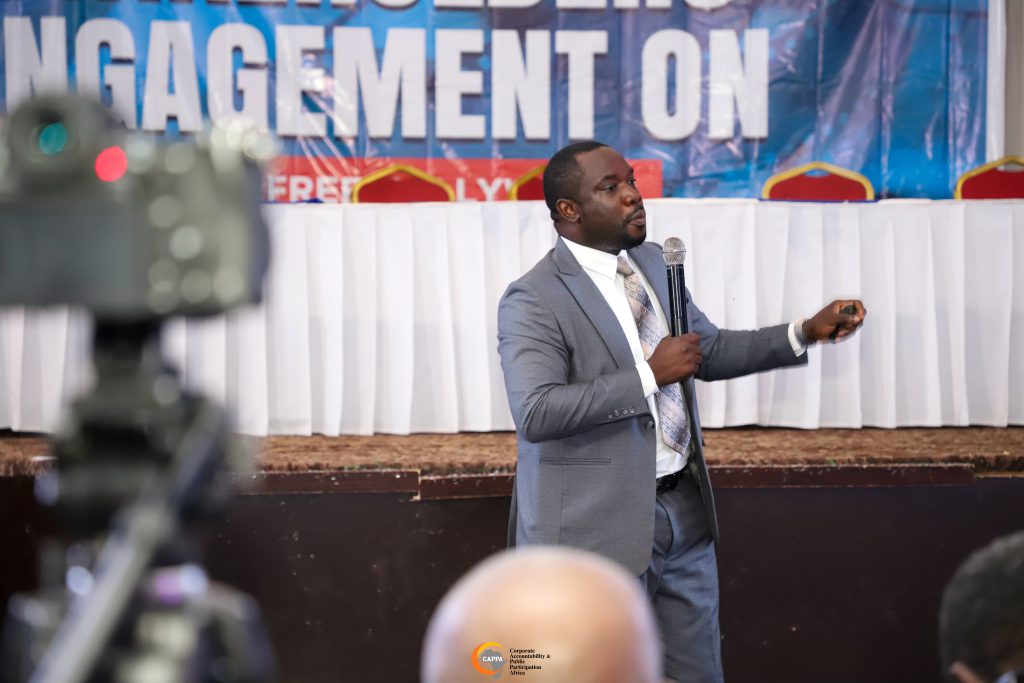
He revealed that the Board has been saddled with the task of fashioning out enlightenment programmes in secondary schools, tertiary institutions, local communities, faith groups and other institutions, and imposing restrictions on home movies promoting social vices. He emphasized that the Board was moving away from the regime of censorship to classification because that is the way to go in the world of best practices.
On his part, the Managing Director of NFC, Ali Nuhu, represented by the NFC’s Director, Public Affairs, Brian Etuk, lamented that “Most of our youths have become victims of circumstances having taken to smoking habits, with consequential health challenges and damage to body organs. We must, therefore, use the power of film/movie to help address the gradual but avoidable drifts that are ultimately life-threatening.”
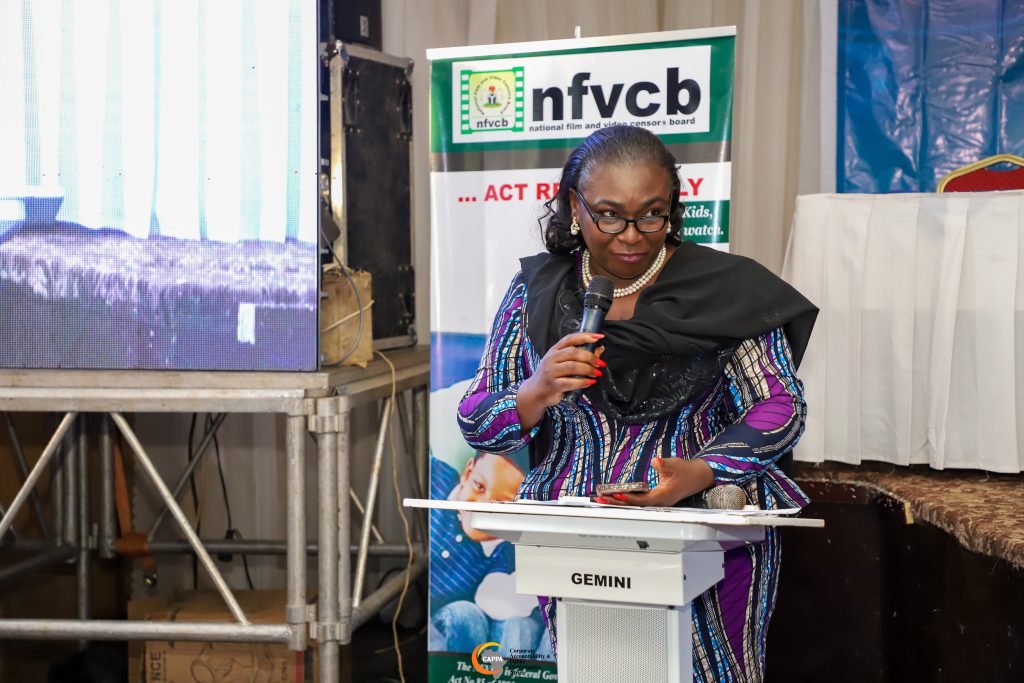
He promised that his corporation was ready to work with the Censors Board and other agencies of government to develop the film industry. He decried the high level of smoking and use of substances in our films, saying this does not portray the country in a good light to the world. He called on scriptwriters, directors and all those involved in the sector to realise the power of their medium on the populace and therefore deploy this with a sense of responsibility.
Film as a powerful tool of communication and mobilisation
Speaking to the stakeholders, the Executive Director of CAPPA, Mr. Akinbode Oluwafemi, gave kudos to all those involved in Nollywood for making the genre accepted worldwide. He saluted their determination to soldier on despite all the challenges facing the sector in the country. He, however, appealed to them to always remember that they have enormous powers, thus they should be aware of this power to shape the narratives and therefore be very careful in deploying it.
In appealing to them to join in the fight against smoking and help curb the spread of non-communicable diseases, he acknowledged their contributions saying, “With the power to tell the Nigerian story, shape our future, and build a genuinely productive society, Nollywood has a role to play in ensuring that the growing concerns on non-communicable diseases in Nigeria is addressed. There is the need to reverse the role movies and music videos play in painting smoking and tobacco use as a cool way of life.”
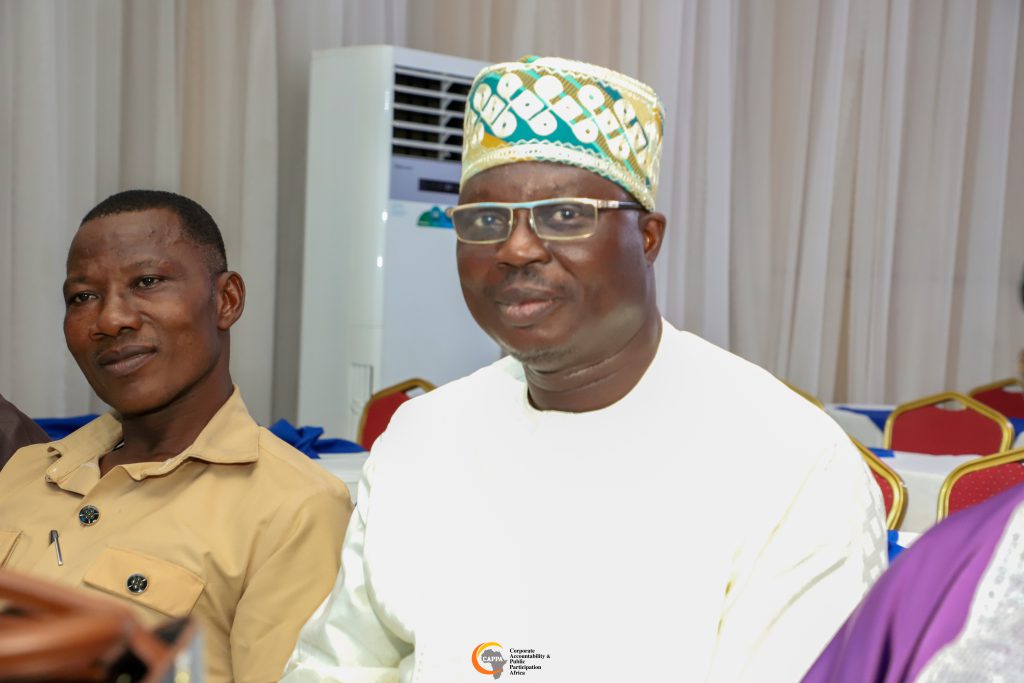
He deplored the fact that more than five million young Nigerians aged 15 years are addicted to smoking. This has to stop and the practitioners are at a vantage point to help in doing this through their works, he concluded.
In his presentation, a Public Health Consultant at the University College Hospital, University of Ibadan, Dr. Francis Fagbule, listed how tobacco smoking has continued to militate against public health in the country. In his paper, “Tobacco Smoking as a Public Health Menace”, he said apart from causing lots of harm to its consumers, it also takes a pricy chunk of the public health budget to combat the non-communicable diseases linked to tobacco. He therefore called for caution and consistent education through the use of movies.
The In-Country Representative of the Campaign for Tobacco-Free Kids (CTFK), Mr. Micheal Olaniyan, expressed the willingness of the organization to work with CAPPA and NFVCB towards a #Smokefee Nollywood because it believed it would impact not only Nigeria but the world in general. He said the tobacco industry after realizing it was no longer possible for it to engage in open advertisement of its odious product has been stretching to influence the entertainment industry because of its power and ability to influence the young ones. This he observed must not be allowed to happen. This was also stressed by Mr. Wale Makanjuola of the Nigeria Tobacco Control Alliance (NTCA). He said the stakeholders meeting was an important milestone to make makers and shakers of Nollywood key into making our screen smokefree.
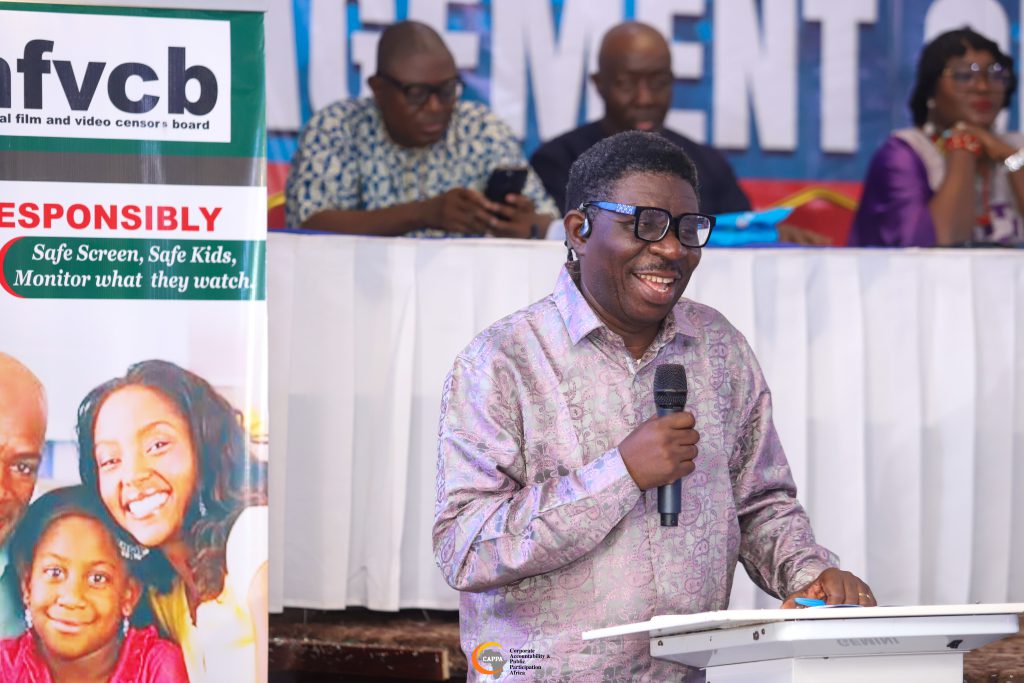
Dr Victor Okhai, the National President of the Directors Guild of Nigeria (DGN) in his goodwill message said, “We (Nollywood) owe our generation the due to collectively work for a responsible screen. We have the responsibility to redefine ourselves and how people see us.” He appealed to his colleagues to see the meeting as a call to duty, a call to take their arts in the direction of helping to promote public health of their audiences.
The Enugu State Commissioner for Culture and Tourism, Dame Ugochi Madueke, noted the “incredible influence” Nollywood has over public perceptions and behaviours and urged the professionals to promote public health by making their movies smoke-free. She observed that “Onscreen smoking influences viewers, especially the young. We cannot afford to let this continue. We must work together to make our films #smokefree. We must advocate policies that regulate our films.”
The Commissioner appealed to the film industry professionals to work with the government and its agencies to create engaging films that educate. In his goodwill message, Mr Emeka Mba, the chief executive of Engu-based AfiaTV, while commending the Censors Board for the initiative, said it was important to give credit to the government for its appointments in the creative sector. He wished the Husseini a successful tenure.
A learning curve and eye-opener
Some of the stakeholders of over a hundred and ten who attended the workshop expressed their delight to the organisers (NFVCB and CAPPA) for the opportunity to recharge and redirect their production to a worthy cause. They said calling their attention to some of the issues raised at the working was a learning curve for them and a call to societal duty and responsibilities to dedicate their Talent to the service of a better society.
Dr. Queen Blessing Ebigieson, National President of the Association of Movie Producers (AMP), in commenting about what has come to be termed ‘The Enugu Declaration” said, “I think it is a great venture. We can’t stop creatives from telling their stories. When you make a film and there is a scene involving smoking, there must be a warning card to alert viewers. I will push that we make our movies #smokefree and I have said that I’ll encourage my members to join the train. I am excited that it is coming to Nollywood because we are shaping our world and the people so we must work on it. It is a welcome development for our industry to key into it and shape our future. We have had an amazing time. We all love the Dr Husseini; he respects everyone and carries everyone along.”
On his part, Teco Benson (MFR), a veteran actor and producer said, “I am pleased about the workshop. The angles that were explored here, I never looked at before now. I never looked at the issue of smoking in movies as any big deal. However, with this workshop, it has opened a new vista for me. I have a Master’s degree in Communication and I know film is a very powerful medium. People use it as a mirror. The Censors Board and CAPPA have brought us to reason together. The new DG of the Board is known to us and we know him as a serious person, so when he called us for this event we came gladly knowing he is a deep and serious professional.”
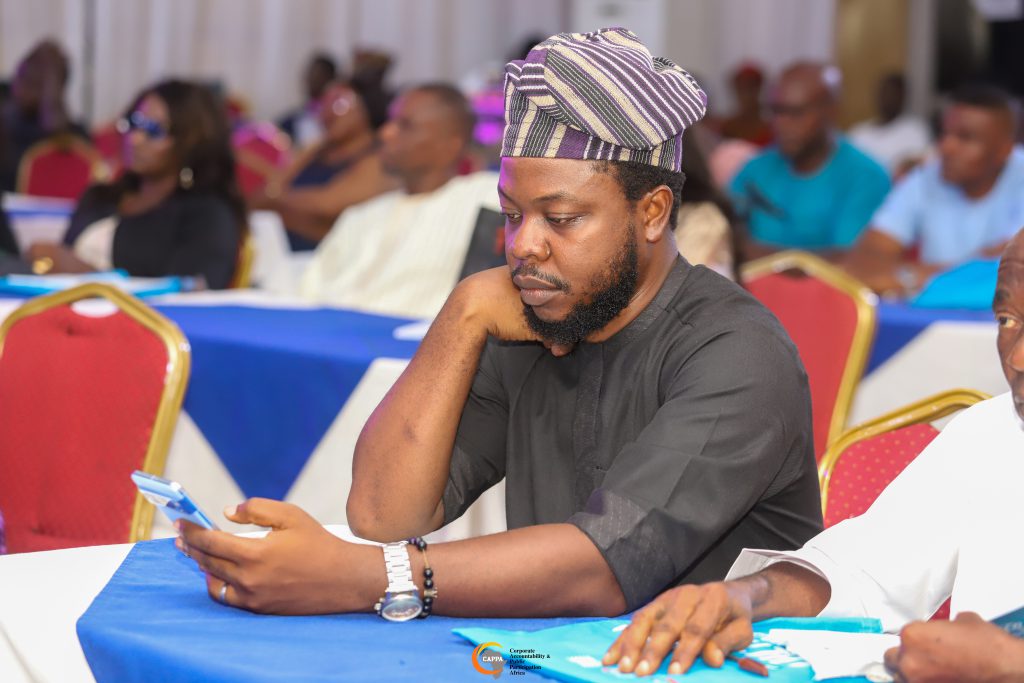
He observed “My takeaway from this workshop is to use this as a learning curve. I came into the film industry to use it as a vehicle of change. So, I will work towards that in my future films. It should be a moral burden on all filmmakers to work with the declaration.”
The National President of Association of Nollywood Core Producers and Founder, the Lagos International Film Convention, Theophilus Akatugba, who said he was impressed with the level of discussion described the workshop as timely and useful. He added, “It is very defensive of our society, and this is how it should be in all facets. If our government had this idea, they could have shaped the film industry in a way that the messages that have been sent in our films in the past that have damaged our reputation wouldn’t have happened. We could have used the media better. So, they have put their agenda on the table and the producers instead of meeting a brick wall at the Censors Board know what not to do. It is good to sensitise them so that when a producer is reading a script and he sees the glamourization of cigarettes and all other vices he knows what to do, and if a prop officer is trying to paint a criminal, cigarette smoking will be out of it. I find the workshop strategic.”
He added that what happened at the workshop was not restrictive to creativity but a way to awaken all to their responsibilities as users of the media, “Any creativity that does not build the future is anti-societal development. We must build our future. For instance, India has been producing films for the world without glamourizing sex. There is no art that does not have a cultural basis” He called on other government agencies to wake up to the national agenda.
Participants at the workshop cut across all cadres of Nollywood. These included veteran and top filmmakers, producers, scriptwriters, marketers, and distributors from across the country, such as Zeb Ejiro, Fred Amata, Segun Arinze, Bolaji Amusan, and The Aneke Twins, as well as leaders of various guilds and associations in the Nigerian film industry.
- Dr. Oyegbile, a journalist and writer, is a book and film enthusiast
###







